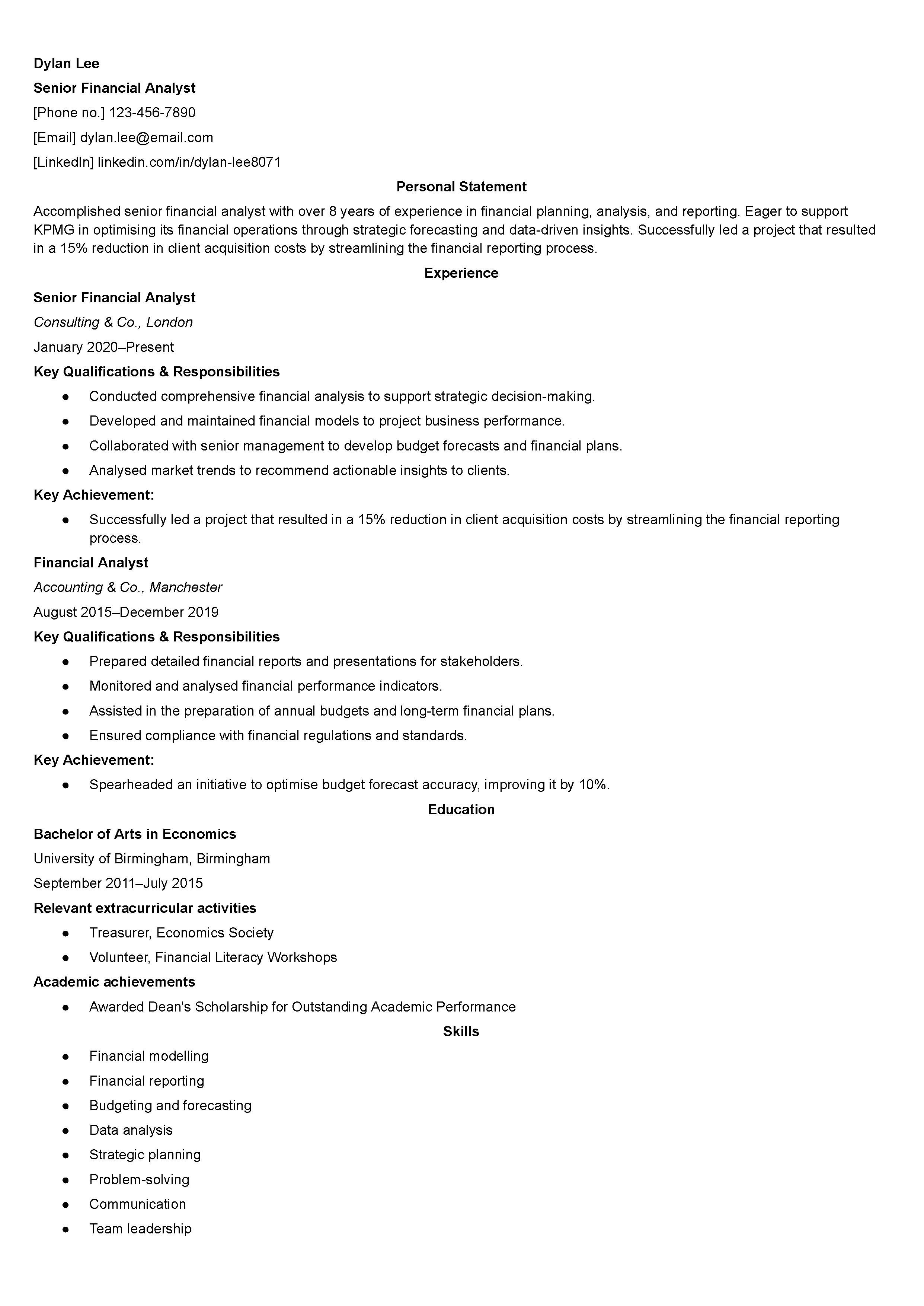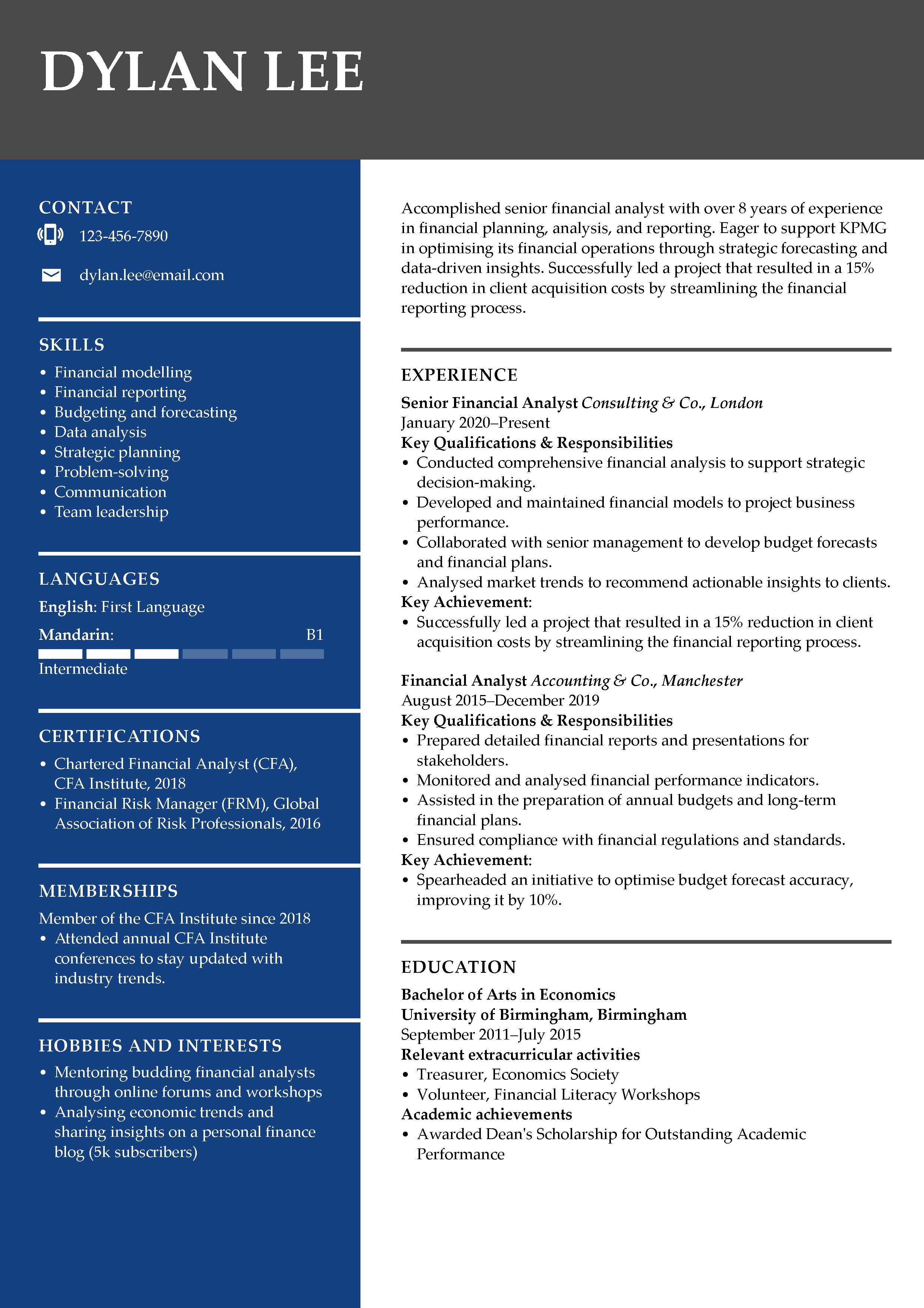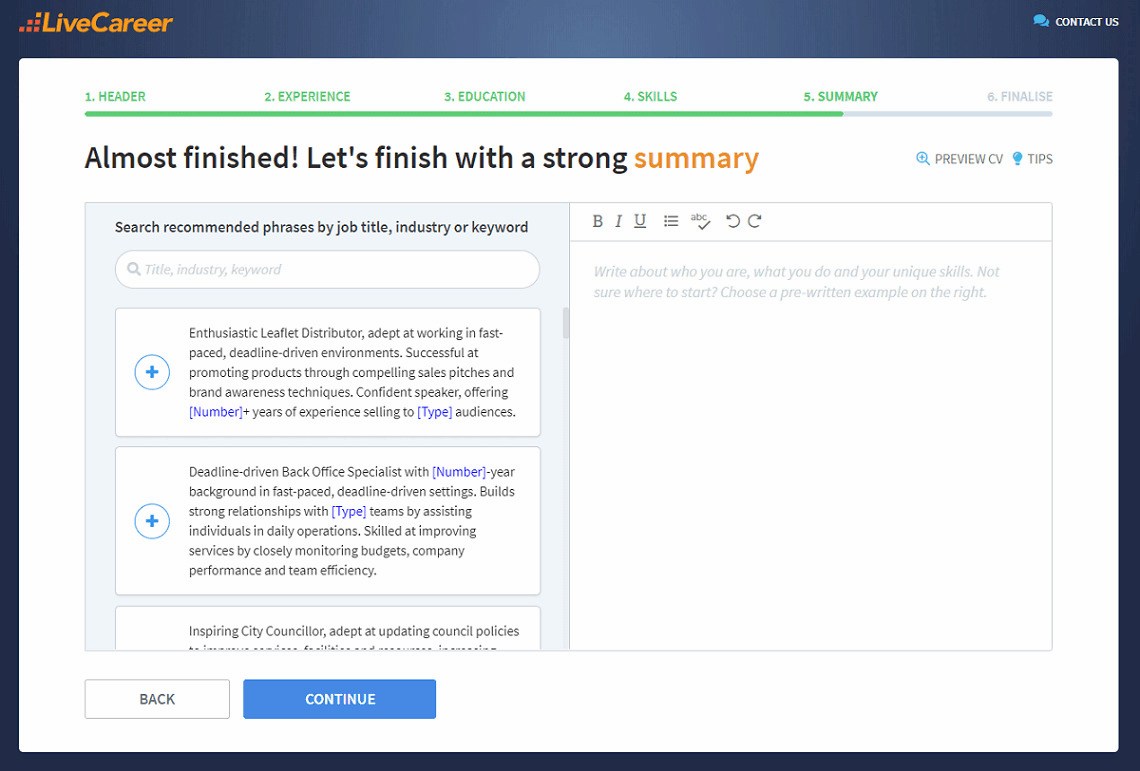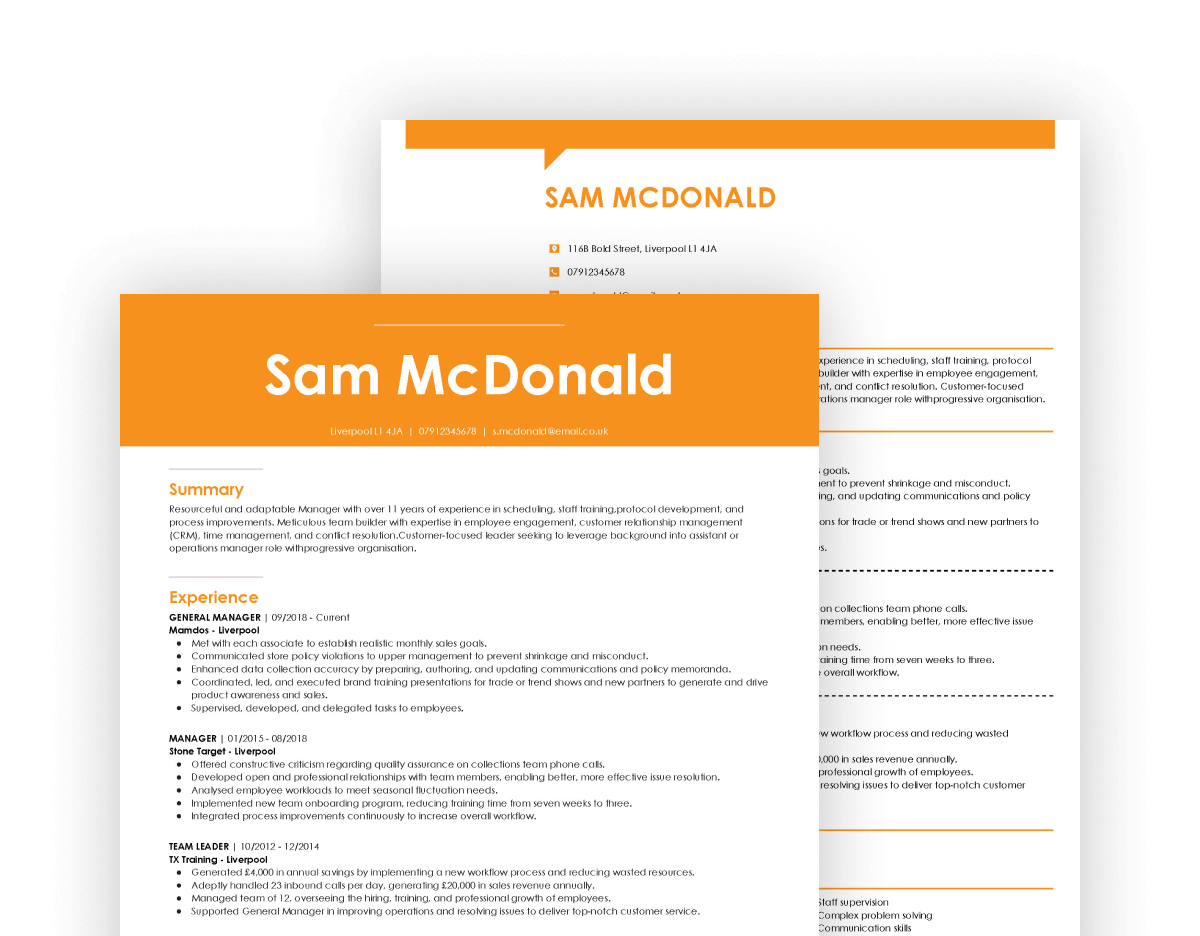Create a professional CV now!
 NO
NO YES
YESOur customers were hired by:
Looking to build an impressive KPMG CV that stands out from the competition? You've come to the right place. In this guide, we’ll show you how to create a CV that highlights your experience, skills, and education, tailored specifically for a career at KPMG. We'll make sure to cover everything from formatting tips to essential skills and qualifications.
Create an effective CV in minutes. Choose a professional CV template and fill in every section of your CV in a flash using ready-made content and expert tips.
Create a professional CV now!
 NO
NO YES
YESWe created the sample on the right using our builder. See other good CV examples like this one.
Here’s a KPMG CV sample in a text version:
Dylan Lee
Senior Financial Analyst
[Phone no.] 123-456-7890
[Email] dylan.lee@email.com
[LinkedIn] linkedin.com/in/dylan-lee8071
Personal Statement
Accomplished senior financial analyst with over 8 years of experience in financial planning, analysis, and reporting. Eager to support KPMG in optimising its financial operations through strategic forecasting and data-driven insights. Successfully led a project that resulted in a 15% reduction in client acquisition costs by streamlining the financial reporting process.
Experience
Senior Financial Analyst
Consulting & Co., London
January 2020–Present
Key Qualifications & Responsibilities
Key Achievement:
Financial Analyst
Accounting & Co., Manchester
August 2015–December 2019
Key Qualifications & Responsibilities
Key Achievement:
Education
Bachelor of Arts in Economics
University of Birmingham, Birmingham
September 2011–July 2015
Relevant extracurricular activities
Academic achievements
Skills
Certifications
Memberships
Member of the CFA Institute since 2018
Languages
Interests
As a leading professional services firm, KPMG looks for candidates who possess a wide range of skills and abilities. Some of the key skills you will need to succeed at KPMG include strong analytical and problem-solving skills, as well as the ability to work in a fast-paced, dynamic environment. The exact skill set depends on the role you’re aiming for, as KPMG hires professionals from many business sectors including finance, accounting, law, data science, and others.
Now you know what type of skills you need to work at KPMG. Let’s find out how to create a CV highlighting your abilities and professional achievements.
The personal statement in your CV works as a professional introduction. Its purpose is to convince KPMG’s hiring managers that you’ll fit in their workforce and excel in your role. There are two main types of statements you can create, depending on whether you’re a seasoned professional or an entry-level applicant.
As a professional with a few years of experience, you should start with a strong CV summary. Reflect on your professional experience, skills, and abilities that make you an ideal candidate.
If you’re crafting a student CV or applying for an entry-level role, emphasise your educational achievements in a CV objective.
Next, align your qualifications with the job description to emphasise who you are, what you bring to the table, what you seek, and your goals.
A strong CV summary will convince the recruiter you’re the perfect candidate. Save time and choose a ready-made personal statement written by career experts and adjust it to your needs in the LiveCareer CV builder.

If you have relevant professional experience that matches your desired position, start your work experience section with the most recent roles, following a reverse chronological format. State your job title, employer's name, and dates of employment (use "present" if you’re currently employed), followed by up to six bullet points detailing the job. Use CV action words such as coordinated, implemented, or performed to add impact. Focus on measurable achievements rather than just listing duties.
Lacking work experience doesn’t necessarily mean you can’t apply to KPMG. This company offers apprenticeship and work opportunities for a large variety of applicants. Just focus on making a great education section in your KPMG CV following the tips from the next chapter.
For school leavers, list the name of the school, its location, and the dates you attended. Mention your individual A-levels, but for GCSEs, include only Maths and English—employers often look for passes in these subjects. If you have a degree, state the university name, the years attended, and the degree title. If you’re still studying, mention your expected graduation date.
Perhaps you’ve got relevant qualifications in finance, audit, or business? Include the institution's name, certification title, NVQ level, and dates.
If you lack work experience, place your CV education section before the work experience section.
In the CV skills section, list a mix of soft skills, hard skills, and technical skills. Provide a brief sentence showing how you demonstrate each skill. For instance, if you mention analytical thinking, specify your experience with data analysis tools or methodologies.
To make your application stand out, consider adding extra sections. Language skills can be very valuable, particularly in a global firm like KPMG. Highlight any volunteer work, as managers prefer to hire candidates with such experience. You could also include relevant projects, awards, and hobbies as long as they serve to bolster your application for the role at KPMG.
Your KPMG CV without a cover letter is like a strategy without execution—missing a key element. While your CV lays out the facts, your cover letter is your opportunity to connect those facts to the role and make your application truly stand out.
Start your cover letter with a strong opening that highlights your unique value, such as your passion for KPMG’s core values or a notable achievement relevant to the role. In the body, emphasise key skills, professional experience, or transferable qualities, especially if you're applying for an entry-level position. Show how these align with KPMG’s requirements and culture.
In the closing paragraph of your KPMG cover letter, explain what you bring to the table and confidently express your interest in contributing to KPMG’s success. End with a clear and professional request for an interview.
Keep your cover letter concise and structured. Ideally, it should be one page, divided into three to four well-organised paragraphs that are easy to read and impactful.
Lastly, adhere to these CV formatting rules:
Don’t forget to create a compelling cover letter to strengthen your application. When writing your cover letter, present how your skills and experience will help you to excel at KPMG.
This guide ensures that your KPMG CV is a standout document brimming with professionalism and tailored to catch the recruiter's eye.
You don’t have to be a CV writing expert. In the LiveCareer CV builder you’ll find ready-made content for every industry and position, which you can then add with a single click.

Need a different CV example? See these guides:
Thank you for taking the time to read this guide. Do you have any additional tips for creating a compelling CV for KPMG jobs? Let us know in the comments section!
Our editorial team has reviewed this article for compliance with LiveCareer’s editorial guidelines. It’s to ensure that our expert advice and recommendations are consistent across all our career guides and align with current CV and cover letter writing standards and trends. We’re trusted by over 10 million job seekers, supporting them on their way to finding their dream job. Each article is preceded by research and scrutiny to ensure our content responds to current market trends and demand.
About the author
LiveCareer UK CV builder is powered by career experts, CV writers, and HR professionals. Since 2013, our editorial team has supported job seekers with free, research-based career advice and expert tips to improve their job applications. LiveCareer UK CV builder has already helped thousands, and you can be next.
Rate this article:
Kpmg
Average:


Learn when and how to put references on CVs, who to choose, and view CV reference examples. Read on for the best tips to make your CV references count.
![Resume vs CV: Key Differences + Examples [2025]](https://cdn-images.livecareer.co.uk/pages/resume_vs_cv_lcuk_1.jpg?fit=crop&h=216&dpr=3)
Resume vs CV. What are the differences between them? Is their format any different? And which one should you use in the UK? Check the answers here.

LinkedIn can be a powerful networking & job-hunting tool (or a necessary evil), learn how to add your CV to LinkedIn & decide how you want to use it.
Our customers were hired by: